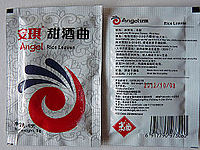
Photo from wikipedia
This work aimed to evaluate the production of lipolytic complexes, produced by microorganisms isolated from a biological treatment system of effluents from a hotel. To select the best lipolytic microorganism… Click to show full abstract
This work aimed to evaluate the production of lipolytic complexes, produced by microorganisms isolated from a biological treatment system of effluents from a hotel. To select the best lipolytic microorganism for use in biotechnological processes, we tested 45 bacterial isolates recovered from the raw effluent of the hotel's restaurant waste tank. Lipase production was assayed in culture medium supplemented with olive oil and rhodamine B, incubated at 25 °C and 30 °C for 24 h - 48 h. Results showed 22 isolates lipase producers. All isolates were inoculated on medium without yeast extract to select the ones with highest enzyme yields. Out of these, nine isolates showed high lipase activity. The strain with the larger halo was assayed in submerged culture using an orbital shaker and a bioreactor, with three different substrates (olive oil, grape seed oil, and canola oil). Isolate G40 identified as Acinetobacter baylyi was selected to run the production assays because it showed the best result in the solid medium. In the bioreactor, maximum lipase production was obtained after 12 h of culture with the three substrates evaluated: 0,358 U/mL.min-1 in olive oil, 0,352 U/mL.min-1 with grapeseed oil, and 0,348 U/mL.min-1 with canola oil.
Journal Title: Anais da Academia Brasileira de Ciencias
Year Published: 2018
Link to full text (if available)
Share on Social Media: Sign Up to like & get
recommendations!